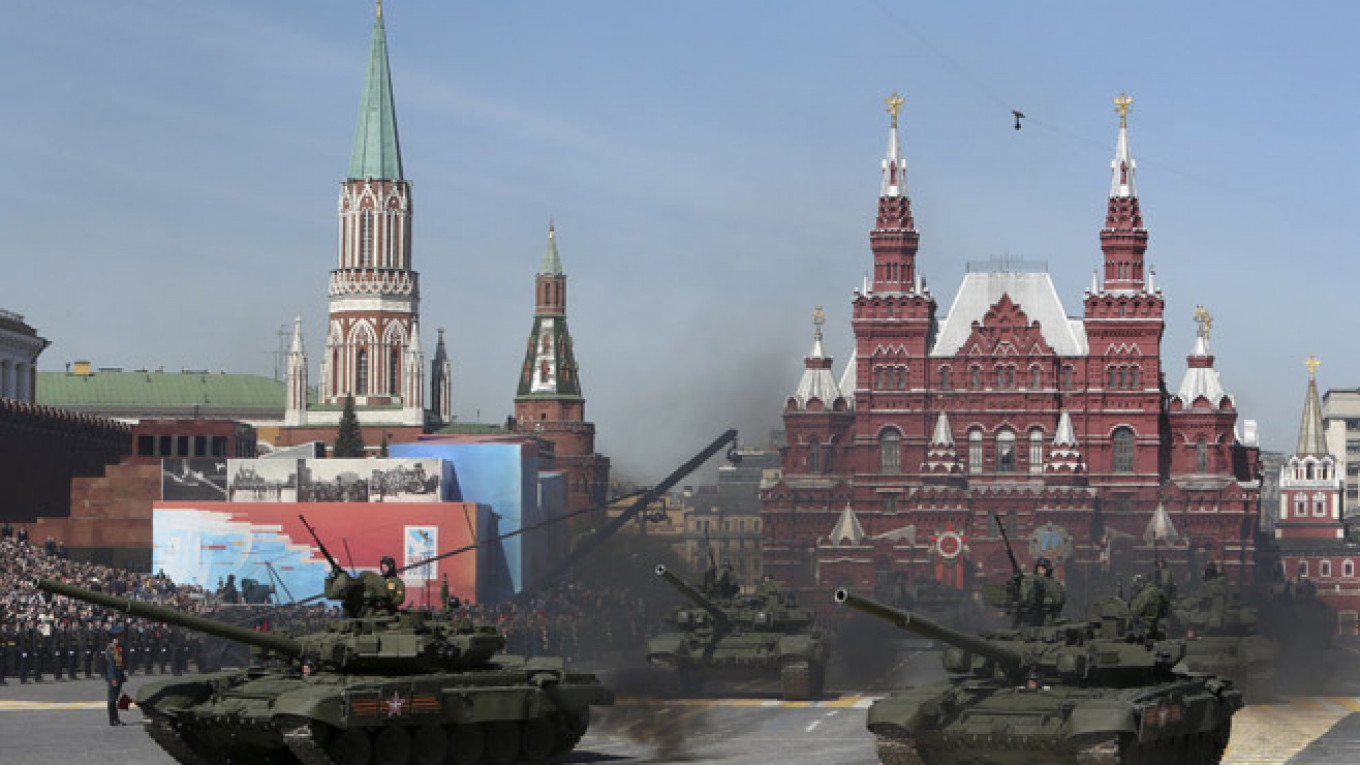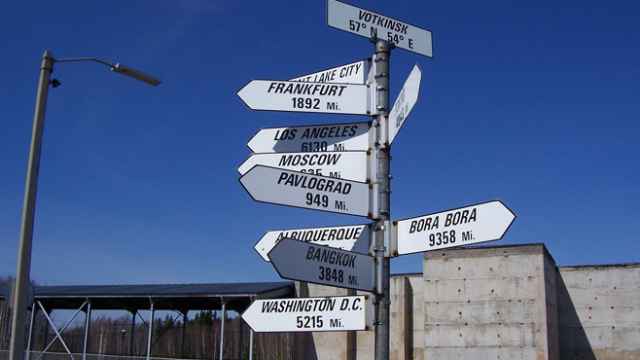Though some observers might find themselves overwhelmed by the flow of enthusiasm in honor of the 70th anniversary of Russia's victory over Nazi Germany, most would agree that the country takes good care of its veterans.
Military personnel in general occupy a universally respected position in society that must be the envy of former soldiers from other nations. Just look at the recent exposés in the U.S. and Britain concerning shoddy and delayed health care.
But as the tanks and missiles roll across Red Square on Saturday, I have to admit a certain fatigue will have set in, having had my fill of St. George ribbons, documentaries, films, speeches, posters, billboards, and so forth for the past months. May those who deserve the honor stand tall and bask in the glory, but the question arises: what will the 2016 parade will be about? Seventy-one years? It sounds lame and lacks a sense of progress.
Locals and attentive foreigners alike will concur that the Russian national identity is at a precarious stage of development. It seems to be taking on a conservative and xenophobic spirit. For those of us who have spent our adult lives witnessing first-hand the country's emergence from the dull hibernation of the Soviet era into the sunlight of the global family of nations, this is depressing.
Russia's positive global reputation seems to have peaked at the closing ceremony of the Sochi Olympics, when even my most cynical friends here said they were proud of their country. This on the heels of the Kremlin's successful effort to dissuade the U.S. from executing a poorly thought-out military plan against Syria — which resulted in murmurs about a possible Nobel peace prize for Putin.
That brief romance is over. In the end, Russia will decide where she goes and how she is perceived. But I'd like to propose a scenario that would result in a Victory Day parade next year that no foreign power would consider boycotting.
I've no doubt that the Kremlin could leverage the current "Sovereign Democracy," add its influence via a toadying mass media, and from Tuesday next week begin to turn the national consciousness in another direction. We could forget our external enemies, the alleged abuse of our countrymen in Russia's neighboring states, and our economic woes.
We would turn our attention to a new identity — one that reflects Russia's unique history and undisputed leadership in a field that is respected at home and abroad. I'm talking about space exploration. Russia is one of the two great space faring nations on earth.
From the first artificial satellite to the (eventual) completion of the Vostochny Cosmodrome, the track record of commitment and enthusiasm, has been fairly consistent — even in the darkest days of want after the breakup of the Soviet Union.
I see a parade next May where venerable cosmonaut-pioneers Alexei Leonov and Valentina Tereshkova are the co-hosts. Various floats will wend their way through the city. Mock-ups of Sputnik, Soyuz and Mir will be accompanied by parading workers from the great manufacturers and institutions: Khrunichev, TsUP, Star City.
Perhaps they can even find a way to put that group of masochists sealed in a simulated Mars-trip habitat on the back of a truck. They can wave from their windows. For sure they deserve some sunlight and praise. The route will be lined with posters bearing visages of the giants of old: Tsiolkovsky, Korolev, Keldysh.
Konstantin Ernst will be hired to produce a multi-media grand finale along the lines of what he did in Sochi. Finally, sub orbital missiles synchronously launched from a variety of bases and platforms (road mobile, submarines, Baikonur) will rain MIRVs (multiple independently targetable reentry vehicles) down on every major metropolitan area of the country, though they will contain elaborate fireworks instead of nuclear warheads.
In the 12 month run-up to the event, poetry will be written by professionals and memorized by school children. New science fiction, fact and fantasy films and documentaries will be commissioned, while older ones will be remastered and recent additions, like last year's ''Gagarin: First Man in Space'' will be reissued in the director's cut.
There is no shortage of stories to tell: Korolev vs. Von Braun and the race for rocket supremacy (according to IMDb it's already in the works); those desperate Americans using Russian engines to launch their military satellites; how the space station MIR survived the breakup of the Soviet Union; how the latest imaging satellites are being used to protect Gazprom's pipeline network and increase the tax base by aiding cadastral map making.
The story is not Russia's alone. It will serve as a unifying force for former Soviet republics (Ukraine, birthplace of Korolev and some of the finest rocket engines; Kazakhstan, Russia's main launch pad for now) and the international players — the U.S., Europe, Japan, India, China — who even in today's chilly geopolitical environment continue their cosmic cooperation with Russia. Their floats and poems will be welcome, and their country's leaders will gladly join the podium.
As the sun sets on May 9, 2016 the crowds will disperse, no longer fearing NATO or contemplating the geography of eastern Ukraine, but pondering honorable lunar features like Mare Moscoviense and Mons Usov, Montes Riphaeus and craters named for Kurchatov, Mendeleev and Yury.
And still the holiday will be a celebration of victory: over mankind's limitations, fears and prejudices.
Justin Lifflander was an inspector for the Intermediate Range Nuclear Forces Treaty and later business editor at The Moscow Times. He is the author of "How Not to Become a Spy: A memoir of love at the end of the Cold War" (Gilbo Shed, 2014).
A Message from The Moscow Times:
Dear readers,
We are facing unprecedented challenges. Russia's Prosecutor General's Office has designated The Moscow Times as an "undesirable" organization, criminalizing our work and putting our staff at risk of prosecution. This follows our earlier unjust labeling as a "foreign agent."
These actions are direct attempts to silence independent journalism in Russia. The authorities claim our work "discredits the decisions of the Russian leadership." We see things differently: we strive to provide accurate, unbiased reporting on Russia.
We, the journalists of The Moscow Times, refuse to be silenced. But to continue our work, we need your help.
Your support, no matter how small, makes a world of difference. If you can, please support us monthly starting from just $2. It's quick to set up, and every contribution makes a significant impact.
By supporting The Moscow Times, you're defending open, independent journalism in the face of repression. Thank you for standing with us.
Remind me later.







